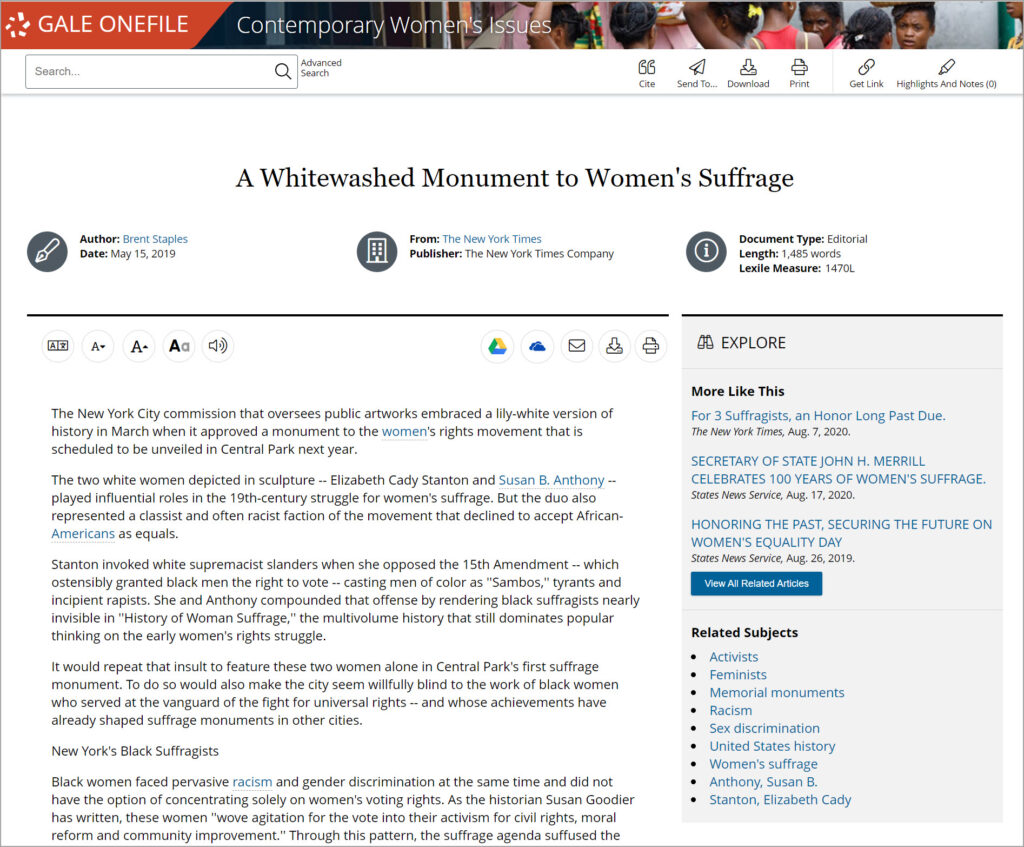| By Gale Staff |
Just a century ago, women in the United States were given the right to vote. On August 18, 1920, following years of civil unrest, Congress ratified the 19th Amendment. However, the legislation was not officially signed and certified until a week later. Because of this small administrative detail, we observe Women’s Equality Day on August 26.
Women’s Equality Day is a chance to recognize those throughout history who fought for women’s rights, but it’s also an opportunity to consider ongoing inequalities between genders. As the day approaches, academic librarians can build Women’s Equality Day themes and activities into their end-of-summer schedules. Find reliable content from Gale OneFile: Contemporary Women’s Issues for your research, and be sure to share this resource with your student body.
Highlight History’s Lesser-Known Women’s Equality Leaders
You and your students may already be familiar with historical women’s suffrage leaders like Susan B. Anthony and Elizabeth Cady Stanton, two 19th-century reformers who first introduced the Women’s Suffrage Amendment to Congress. However, these two figures were products of their time, and both held controversial views. So why not employ Gale OneFile: Contemporary Women’s Issues and learn about women’s suffrage activists who received less of the spotlight and advocated for all women?

Ida B. Wells was an African American journalist born into slavery who later attended college and became an influential figure for equal rights. She founded the National Association of Colored Women’s Club to help advance both women’s suffrage and civil rights. There was also Dr. Mabel Ping-Hua Lee, a Chinese immigrant who became a leading suffragette in New York City at just 16 years old? However, because she was Chinese, she would not be given the right to vote in 1920. Still, she protested diligently for women’s voting rights. While the story of the fight for women’s equality is overflowing with brave characters, unfortunately, many of their names are lost to history.
Emphasize Current Women’s Equality Advocates
Today, women continue to struggle for equal rights. Thankfully, many amazing individuals are still ready to stand up and take charge. This is especially important in other nations, where women fight for basic opportunities like education and healthcare. For example, young Iranian women speak out against government corruption and violence, though many can’t share their names for fear of retaliation from those in power. And in Ethiopia, there’s Liya Kebede, a fashion model who is using her celebrity to raise awareness and funding for maternal healthcare in Africa.
While discussing modern women advocating for change, you can’t forget Mary Beard, a classic literature professor who publicly opposes those who harass and sexualize women on social media. She’s even been named the “Troll Slayer” for her work pushing back on and trying to educate online bullies. In her classes, she’s subverting how ancient history is traditionally taught. Instead, she’s embracing a feminist perspective and considering the role of women and gender in the ancient world.
No matter if we call them feminists, suffragettes, or activists, there are so many amazing people working to advance gender equality. This August, use Gale OneFile: Contemporary Women’s Issues to highlight a diverse, lesser-known set of women’s rights advocates, not simply the central players.
Consider How Women’s Rights Have Evolved
This August, librarians might also focus on the evolution of women’s rights in the United States. After all, the meaning behind women’s equality has changed over time. A century ago, the 19th Amendment ensured the right to vote. Sixty years ago, The Equal Pay Act sought to protect equal pay regardless of gender. Fifty years ago, the Roe v. Wade Supreme Court decision granted women the right to an abortion. And just 35 years ago, Title IX protected access to educational opportunities regardless of one’s sex.
As women’s equality advances, so does the presence of women in leadership positions within the United States. The current session of Congress is made up of more women than ever in history. The U.S. has a female vice president. And for the first time, women lead more than 10% of Fortune’s top 500 companies.
No matter your focus, Gale OneFile: Contemporary Women’s Issues houses both current and non-current relevant materials. Users will find magazine articles, news pieces, book reviews, full-text documents, and vetted and frequently updated databases, evolving with the ever-changing landscape of women’s issues.
Observe Women’s Equality Day on Campus
Despite all of these accomplishments, there are still inequalities between the genders. In some ways, women’s equality initiatives are stagnant or even moving backward. The Supreme Court recently overturned decades of legal precedent with the Dobbs decision, leading to real ripple effects throughout the country. For this reason, celebrating National Women’s Equality Day is even more important. You can help dispel misinformation by sharing the library’s reliable academic resources and planning campus activities around women’s equality.
Looking for ideas? Consider providing a list of all the women-focused student organizations on your campus, including how to get involved. Create a display that highlights women’s health agencies in your community. Invite local female business owners to your library to speak and share their experiences, or post about the accomplishments of female leaders within your community or around the world. Above all, talk to the members of your campus who identify as women. Ask them what they’d like to see change and how your campus could better support and empower them. Find a way to help give the women on your campus a voice.
Introducing figures like Dr. Mabel Ping-Hua Lee or Liya Kebede to your college library and showcasing their stories brings attention to National Women’s Equality Day, and sharing these resources can inspire the members of your campus who identify as female. Show them the powerful leaders and activists who represent them and speak for the issues they care about. With Gale OneFile: Contemporary Women’s Issues, you can feel confident that your student body is accessing only the most relevant and accurate information. The ongoing conversations about women’s equality, whether regarding equal pay, childcare, or abortion, are more than hot-button topics. Women’s equality is a vital piece of U.S. history and its future.
College librarians create meaningful, safe spaces for college learners, and Gale’s databases can help you achieve that goal. If your institution does not already subscribe to Gale OneFile: Contemporary Women’s Issues, contact your local Gale representative or visit our website to learn more.

